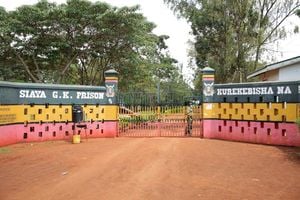Ovine rinderpest is endemic in Turkana and other Asal counties -- experts

Children herd goats and sheep at a seasonal riverbed at Karoge village, Turkana County on July 26, 2020.
Peste des Petits Ruminants (PPR), also known as ovine rinderpest, has been identified by veterinary epidemiologists and animal health stakeholders as an endemic livestock disease in Turkana and all Arid and Semi-Arid Lands (Asal).
The disease is contagious and primarily affects sheep and goats but sometimes camels can also be affected.
This comes after the Turkana County Government rolled out a mass vaccination of livestock following an outbreak of the disease across the devolved unit last month.
County Pastoral Economy Executive Philip Aemun said the disease, locally known as lomoo, became severe as a result of the recent locust invasion.
Mr Aemun said the ailment is spreading among goats and sheep in Lokori/Kochodin, Kapedo/Napeitom and Katilia wards that are the worst hit.
"A total of 45,000 sheep and goats are targeted for vaccination in Turkana East Sub-County as we step up surveillance to ensure targeted vaccination," he said.
He said the vaccination drive is aimed at preventing the spread of the disease to other parts of the sub-county and protect herders from losses.
In Turkana North and Turkana Central sub-counties, a total of 53,262 livestock have been vaccinated and dewormed.
Mr Aemun appealed to herders to coordinate with veterinary officers by sharing symptoms of livestock diseases for the necessary intervention.
County officials from the department of Pastoral Economy and their counterparts from National Government’s Directorate of Veterinary Services are planning a Pestes des Petits Ruminants Vaccine associate award (PPR VAA) project along the Kenya-Uganda border.
"The purpose of the project, which will be funded by USAid, is to assess innovative approaches to PPR control and to build capacity to scale up the vaccine uptake in the region where the disease has been identified as endemic," Mr Aemun said.
Dr Harry Oyas, Head of Disease Surveillance from National Government’s Directorate of Veterinary Services, assured of a comprehensive research that will inform proper eradication strategies in the affected counties that also include Mandera, Samburu and Marsabit.
Dr Oyas said regular treatment and vaccination will tackle the negative socio-economic impact that PPR has had on pastoralist communities in the region.





